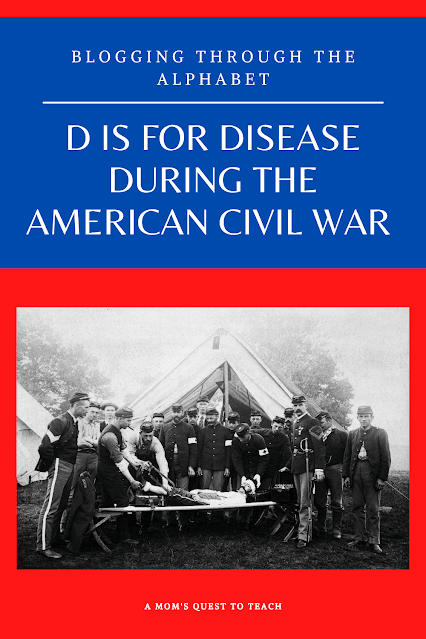This post contains affiliate
links. For more information, please see my Terms of Use and Disclosure Policy
page. Thank you.
Diseases and illnesses were a huge threat to soldiers during the American Civil War. According to The Untold Civil War: Exploring the Human Side of War by James Robertson: "For every soldier who perished in action, two died behind the lines from sickness" (126). What a horrible ratio! And some research even indicates the number of soldiers who died due to disease and sickness could have been even higher.
What Led to Diseases?
The causes of diseases in the American Civil War were some of the same ones that impacted our world for hundreds of years. And while there were improvements over the course of the war, most of the conditions were still present in one place or another.
- Poor food and inadequate diet
- Poor sanitation
- Poor camp conditions
- Poor hygiene
- Ill-equipped or ill-trained doctors and nurses
- Lack of specific courses of treatment
- Lack of knowledge regarding some of the diseases and illnesses
- Battle wounds
- Food poisoning
- Bad weather (rain and heat)
- Mosquitoes and flies
- Filthy drinking water
What were the Typical Diseases?
In an essay, Disease by Stanley B. Burns, MD, it is stated that there were 5.8 million sick cases during the American Civil War. What exactly impacted the soldiers in such great numbers?
- Diarrhea
- Dysentery (diarrhea with bloody stool)
- Malaria
- Typhoid Fever
- Rubeola - Red Measles
- Pneumonia
The two leading diseases were diarrhea and dysentery. Dr. Burns states that: "57,000 deaths were directly recorded to these most disabling maladies. The total recorded Union cases were 1,528,098." Why were diarrhea and dysentery so dangerous? In drastic conditions, it could lead to dehydration and make the men more susceptible to other illnesses and diseases. If they entered battle while suffering from either of these maladies, the soldier could suffer abdominal pain or have a fever.
Following closely behind these two diseases were malaria and typhoid fever. Many suffered from malaria and while doctors and scientists were unsure as to how it was spread and caused, they did prescribe quine which helped keep the number of deaths down. Unfortunately, the same lack of knowledge as to what caused typhoid fever did not mean that there were treatments or cures. 17,000 Confederate soldiers died over one 18-month period of typhoid fever. In fact, one regiment, the 18th VA regiment, lost more men to typhoid fever than to combat.
Final Thoughts
I can only imagine the fear, worry, and anxiety that the soldiers faced during the American Civil War. They were afraid of seeing the elephant (entering combat for the first time), worrying about getting injured or killed, or their friends getting wounded or killed, and they must have been anxious about what was happening back at home. Was their family safe? Was their home being invaded or destroyed depending upon where they were from in the United States? Then one has to factor in their concern over disease and illnesses. So many worries. I am thankful for the advances they did have in medicine that helped and those men and women (like
Clara Barton) who were able to provide medical care, comfort, and relief from diseases, illnesses, and wounds.
Would You Like to Learn More?


And so many were so young - too young.
ReplyDelete